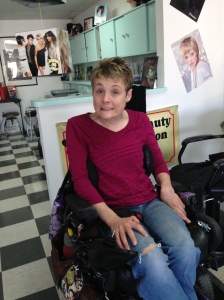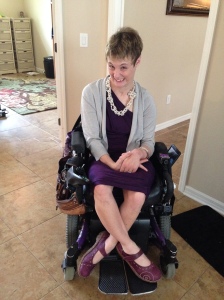
I am determined to do [whatever “it” is] I can do independently, even if it looks a little odd or as if I am struggling. When I go shopping alone, sometimes I sense that the store workers are watching me and ready to pounce when I need help. Being watched as though I do not belong or I may break something is an unnerving feeling.
Why you rush to my assistance before I can even try to do [whatever “it” is] myself? Part of the issue is it looks a bit awkward. For instance, I pull my coat over my head when taking it off, like a little kid. It is painful to watch an individual “struggle” to do [whatever “it” is] when most people can do in a second without thinking, like opening a door, which is not automatic. Finally, it is quicker and easier if you help. You are right there, and you can do it in a second. I understand your need to help me. I really do understand, but let me explain why it is not always helpful.
My Need for Space
Due to my Cerebral Palsy, I need more space than the average person. I make large movements whenever I do gross motor skills. I have difficulty doing smaller movements that are smooth and controlled because of spasticity. As a result, if you try to help me mid-movement, you are at risk of getting hit accidentally, because I cannot react quick enough to stop what I am doing. My spasticity causes me to have uncontrollable movements while doing simple tasks. Sometimes people think I have a learning disability and I do not understand the world around me. Unfortunately this is not the case. I just have to think about what I am doing and adjust according to how my muscles are cooperating at the moment.
Cerebral Palsy is caused by brain injury causing disconnect between the brain and the muscles. When I was born, I was not breathing, which caused my brain injury. Cerebral Palsy does not affect my ability to learn or to understand the world around me, though you can have learning disabilities as well. The disconnect between the brain and the muscles is what causes the abnormal movements.
Although it may seem I have no control over my muscles, I do have control over my movements. People always jump to my rescue the first time they see me get out of my wheelchair and crawl on the floor, because I move like drunken sailor. I understand my movements and know how to work with my spasticity. I just require more space than most individuals.
My Need for Time
Because of my wild and uncontrollable movements, I take more time to do every day tasks. I need to be as independent as possible, because you or someone else will not be there to help me the next time I need to do it. The more often I do a task, the quicker and easier the task will become. I know you have time limits set in your head, but I live by different limits. I need a great deal of patience to do every day tasks, but I know I can.
My Need for Patterns
Unlike the average person, I need to do the same activity the same way each time. It is very repetitive, but it works. During the weekly #CPChatNow[ED1] Twitter conversation, John W Quinn said, “Patterns are the ways to get the task done.” When you jump in to help, you disturb the pattern and my ability to finish the task. Remember the more you do for me, the less I can do for myself. In the Cerebral Palsy world, if you do not use it, you loose it. When I get out of patterns, I loose the ability to do [whatever “it” is].
On the flip side, when I do the same task ten times in a row, the eleventh time I may not be able to do it. Fatigued sets in and stops me from being able to perform the task. This is when I need to ask for help. Also my muscle control varies day to day. Some days I am stiff and tight; other days I am floppy and loose. Therefore, I need to change my patterns accordingly and be patient to do so. Strong emotions and the weather can also affect my ability to perform different tasks. Some days I need more help – plain and simple.
My Need to Process
As a general rule, I have a five to ten seconds reaction time delay. There is nothing I can do, but prepare for different situations, if I can. Most of the time my reaction time delay goes unnoticed, but it does prevent me from doing certain tasks, like driving a car or cooking a meal.
Although it has nothing to do with Cerebral Palsy, sometimes I just need to get my bearings as to where I am going next. One day at an airport, I pulled over and stopped in the hallway (something everyone does) to check what gate I was going to, because it determined which security checkpoint I went through. An airport worker came up to me and started asking who I was with (no one), who dropped me off (my friend), and why did they not get me help (I did not know I needed help). If the airport worker asked me if I needed help, I would have said, “No, I am just looking at my ticket to see what gate I am flying out of, but thank you.” Instead the airport worker made a scene all through security, because it was not her job to take me to my gate (I did not ask you to…). These kinds of situations frustrate me, because I am made to feel helpless when I am perfectly able. Please ask before assuming I need help.
So what can you do while you wait for me?
There is a lot you can do while watching me complete a task. It does require a lot of patience and control on your part.
- Be patient: Allow me the time and energy to perform the task.
- Respect my space: Stay out of personal space while I am doing the task. Reaching in to help can interrupt my patterns and hinder my ability to complete the task, although sometimes a gentle hand on my back, especially when I am standing and transferring, can calm and steady my muscles.
- Observe and learn my muscle movements, patterns, space needed, and time allotted. You can learn a lot by observing what I can do, so you can notice when I am fighting fatigue or struggling and need help.
- Respect what I can do. Work with my abilities, not against my dis-abilities. I can do more than not. Allow me the space, time, patterns, and ability to process before jumping in.
- Offer help before helping. Once you observe and learn my patterns and see I am fighting fatigue or struggling, offer help and give me time to react to your offer. Sometimes I am too stubborn to ask for help.
I do believe individuals without disabilities and individuals with disabilities can live in harmony with one another. Each party needs to take the time to learn the other parties’ abilities. Just because I have a disability does not mean I have no abilities, it just means I need extra space and time. I am the one who needs to ask for help when I need it.
[ED1]#CPChatNow is a Twitter conversation every Wednesday at 8pm EST. All are welcomed.
This blog post first appeared on EMDeerx Muse. A decision has been made to combine the two websites.



 Cerebral Palsy often times gives a person a guilt complex for needing help to do the things she wants and needs to do. The guilt complex can drive a person into depression and make her withdraw from her family and friends. It takes a strong network of family and friends to get a person from being trapped by the guilt complex.
Cerebral Palsy often times gives a person a guilt complex for needing help to do the things she wants and needs to do. The guilt complex can drive a person into depression and make her withdraw from her family and friends. It takes a strong network of family and friends to get a person from being trapped by the guilt complex.
